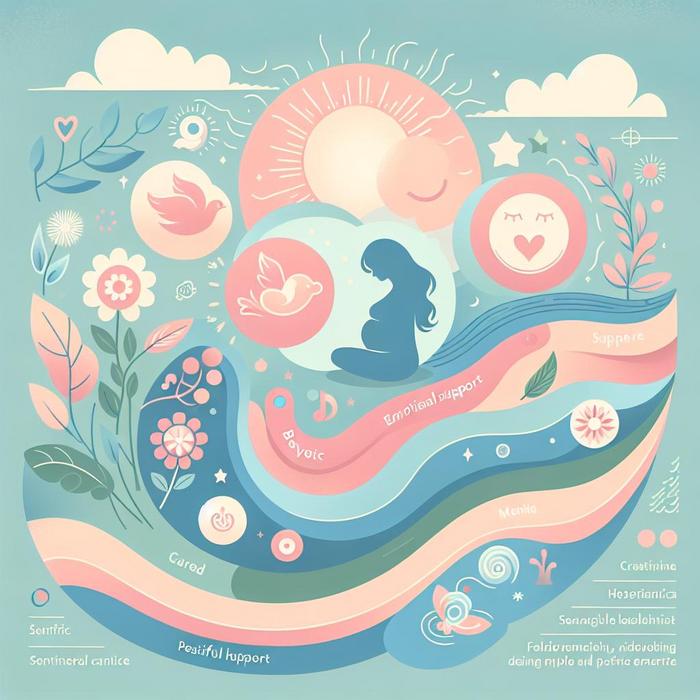Understanding Postpartum Emotions
After childbirth, many new mothers experience a rollercoaster of emotions. From the joy and love for your newborn, to the fatigue and frustration with the changes in your body, postpartum emotions can be overwhelming and difficult to manage. It’s essential to understand that what you’re experiencing is normal, and there’s plenty of support available to help you through this period. This article will delve into postpartum care, providing valuable ideas for navigating this often challenging time.
Recognizing Postpartum Mood Disorders
Postpartum mood disorders are not uncommon and can manifest as the “baby blues”, postpartum depression, or in more severe cases, postpartum psychosis. The Johns Hopkins Medicine provides valuable insights on these conditions. Here are some of the symptoms:
- Feeling sad or overly anxious
- Feeling moody, irritable, or restless
- Oversleeping or being unable to sleep
- Having trouble focusing or making decisions
- Feeling overwhelmed or worthless
- Having thoughts of harming yourself or your baby
If you find yourself experiencing any of these symptoms, it’s important to seek professional help immediately. The Mayo Clinic has outlined the symptoms and causes of postpartum depression, which is a more severe form of “baby blues”. Most importantly, remember that these conditions are treatable with the right help and support.
Strategies for Postpartum Care
Implementing the right strategies can help manage these postpartum emotions. Here are a few tips:
- Seek Emotional Support: Reach out to your partner, family, or friends. Join a support group or speak to a health care provider or counselor.
- Practice Self-Care: Ensure you are resting, eating well, and taking time for yourself. Remember that “me time” is essential for your mental health.
- Physical Exercise: With the approval of your healthcare provider, regular exercise can help boost your mood and energy levels.
Addressing Sleep Issues
Many new mothers struggle with sleep issues, which can exacerbate emotions and mood disorders. Check out our guide on common sleeping problems in babies for tips on how to address some of these concerns.
The Importance of Emotional Support
Emotional support plays a crucial role in postpartum care. It can come from family, friends, healthcare providers, or even online communities. Having someone to talk to and seek advice from can alleviate feelings of isolation, overwhelm, and helplessness. Don’t be afraid to express how you feel and what you need. You are not alone in this journey. Our monthly newsletter provides regular tips and advice, offering ongoing emotional support to new mothers.
Engaging in Family Activities
Family engagement can also play a key role in maintaining mental health and alleviating postpartum emotions. Simple activities like going for walks, reading books, or singing songs can form deep bonds and build a nurturing environment for the baby. For more suggestions on family activities to enjoy in your baby’s first year, click here.
Dealing with postpartum emotions can be challenging, but remember that these feelings are common and treatable. Most importantly, know that you are not alone, and there are numerous resources available to provide the help and support that you need.
Understanding Postpartum Anxiety
Particularly among first-time mothers, a common concern that many women grapple with is postpartum anxiety. As outlined in this detailed National Center for Biotechnology Information (NCBI) resource, postpartum anxiety refers to excessive worrying, nervousness, or fears experienced by new mothers. This condition may also coincide with panic attacks, restlessness, shortness of breath, rapid heartbeat, or even fear of death. It’s critical to remember that like other postpartum conditions, postpartum anxiety is treatable, and professional help should be sought in due time.
Perinatal Depression: A More Encompassing View
While postpartum depression typically characterizes the time after childbirth, it’s important to note that similar conditions can occur before the baby’s arrival. These conditions, collectively known as perinatal depression, include both prenatal and postnatal depression. Here, beginners can find a valuable guide published by the National Institute of Mental Health (NIMH) detailing the factors behind perinatal depression, its signs, and treatment options.
Exploring Treatment Options
Once a diagnosis of a postpartum mood disorder is reached, there are multiple treatment options available, which primarily include medication, therapy, and lifestyle changes. Depending upon the type and severity of the condition, various treatments may be recommended by your healthcare provider.
- Medication: The usage of antidepressants or other prescribed medications can help balance your brain’s chemistry. Always consult with your healthcare provider to discuss the benefits and risks, especially if you’re breastfeeding.
- Psychotherapy: Cognitive-behavioral therapy (CBT) and interpersonal therapy (IPT) can be highly effective in treating postpartum depression and anxiety.
- Lifestyle Changes: Regular exercise, a healthy diet, and adequate sleep can also significantly assist in your recovery. Consider incorporating stress management practices like meditation or yoga into your routine with the approval of your healthcare provider.
Addressing Postpartum Emotional Stress
Postpartum emotional stress can be overwhelming, leading to actions that some may regret. In cases where your emotional health is impacting your capacity to care for yourself or your child, it is important to seek immediate professional help. Intermountain Healthcare provides tips on maintaining mental health after baby, including ways to approach healthcare providers and loved ones for support.
Mental Health Vs. Postpartum Depression
It’s essential to understand that general mental health conditions and postpartum depression, while linked, are distinct in their diagnosis and treatment. This comprehensive article from Women’s Health decisively outlines these differences and provides further resources for those affected.
Embracing the Postpartum Journey
As the postpartum journey continues, each day brings new challenges and experiences. Accepting this transition as a journey rather than a temporary phase can shift your perspective and make this process less daunting. With continuous support and the right treatments, navigating your postpartum journey can indeed become a more comfortable and rewarding experience.

